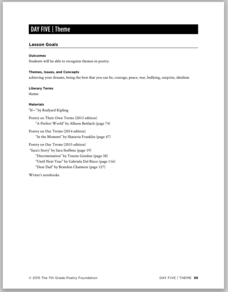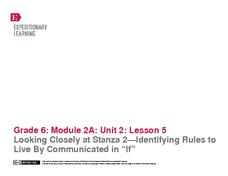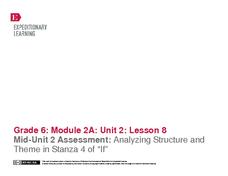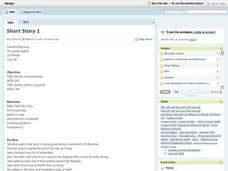Curated OER
Theme
A study of Rudyard Kipling's poem, "If," launches a lesson about theme. Class members read Kipling's poem and poems by other seventh graders to identify the themes.
Curated OER
Excerpt from E.D. Morel's The Black Man's Burden (1920)
The included excerpt would be a perfect contrary follow-up to reading, Rudyard Kipling's White Man's Burden. Journalist E.D. Morel composed the statement against imperialism in 1920. Black Man's Burden is a wonderful primary source...
EngageNY
Looking Closely at Stanza 1—Identifying Rules to Live By Communicated in “If”
Here is a lesson plan in which pupils connect themes and rules to live by from the story Bud, Not Buddy by Christopher Paul Curtis to those found in the poem If by Rudyard Kipling. First, scholars discuss their reading and review Bud's...
EngageNY
Introducing “If” and Noting Notices and Wonders of the First Stanza
After reading chapter 14 of the story Bud, Not Buddy by Christopher Paul Curtis, scholars take part in a read-aloud of the poem If by Rudyard Kipling and compare it to the reading of Bud, Not Buddy. Learners then go deeper into the poem...
EngageNY
Notices and Wonders of the Second Stanza of “If”
Here is an instructional activity that asks pupils to analyze poetry and sparks discussion about two different types of texts: asking how is the poem, If by Rudyard Kipling alike and different from the story, Bud, Not Buddy by...
EngageNY
Looking Closely at Stanza 2—Identifying Rules to Live By Communicated in “If”
Pupils take part in a close reading of the poem, If by Rudyard Kipling, in which they delve deep into its meaning and identify its rules to live by. As the grand discussion progresses, learners then relate the poem's rules with those...
EngageNY
Notices, Wonders, and Vocabulary of the Third Stanza of “If”
How does one's experience reading a poem's text differ from listening to its audio version? Delve into the insightful question with the poem, If by Rudyard Kipling, as pupils compare and contrast their experience using a note-taking...
EngageNY
Looking Closely at Stanza 3—Identifying Rules to Live By Communicated in “If”
Just as Bud, from the novel Bud, Not Buddy by Christopher Paul Curtis, had rules to live by, so does the poem, If by Rudyard Kipling, but how do the two relate? Pupils delve deep into the poem's third stanza, participate in a grand...
EngageNY
Analyzing Structure and Theme in Stanza 4 of “If”
Here is a lesson plan that provides scholars with two opportunities to stretch their compare-and-contrast muscles. First, learners compare and contrast their experience reading the fourth stanza of If by Rudyard Kipling to listening to...
Curated OER
Understanding “If”
Rudyard Kipling's poem "If" provides readers with a chance to practice their reading comprehension skills. After a close reading of the poem, individuals respond to the comprehension and critical thinking questions included in the resource.
Curated OER
Reading: If, A Poem
In this poetry worksheet, students read If by Rudyard Kipling and study the verse by verse paraphrasing. Students answer 2 comprehension multiple choice questions about the poem.
Core Knowledge Foundation
Sixth Grade Poetry
Study some of the most prominent poets and works of poetry in history with a language arts poetry unit. From Virgil to Shakespeare to Dickinson to Angelou, the resources present biographies and examples of poetic elements to the sixth...
Film Education
The Jungle Book
Accompany a viewing of Disney's live-action feature film, The Jungle Book, with a packet equipped with several activities focused on story elements. Scholars discuss and complete diagrams and charts about the movie's characters, setting,...
Facing History and Ourselves
How Do Communities Define We and They?
Learners consider the categorization of people. For this community identity instructional activity, 6th graders examine community membership definitions and consider how those outside of the group view themselves. Learners analyze The...
Curated OER
Short Story
Seventh graders identify the various elements of a short story. After reading Rudyard Kipling's short story, "Rikki-Tikki-Tavi," students identify the author's purpose in writing the story as well as the elements that make it a short...
Curated OER
Do the Tallywalker
Students study the basics of mapmaking, then make a tally walker, (geographic location device used in secret).
Curated OER
"Shooting An Elephant": George Orwell's Essay on His Life in Burma
High school readers examine George Orwell's essay "Shooting an Elephant" for examples of symbolism, metaphor, connotation, and irony. They analyze how these literary tools convey the writer's main point and contribute to the persuasive...
Azar Grammar
Song Lessons: I Wanna Be Like You
Big Bad Voodoo Daddy's swing rendition of Robert and Richard Sherman's "I Wanna Be Like You" offers young grammarians an opportunity to examine verb tenses, noun clauses, gerunds, and prepositions.
Curated OER
Celebrate Books with an Author Study
Children’s Book Week is a great time to inspire a love of reading in your classroom.
Curated OER
European Colonialism in Africa
Examine European colonialism in Africa with an image-driven presentation. Social Darwinism, King Leopold, diamond mines, the Boer War and The Berlin Conference are all discussed.
Worksheet Web
Interrogatives and Auxiliary Verbs
Interrogatives—who, what, where, when, why, and how—are the focus of a grammar worksheet that reinforces writing questions and using auxiliary verbs.
Polar Trec
Talk Story: A Native Way of Knowing
The steps of the scientific method examine a problem, make a prediction, and attempt to solve the problem—similar to the path most stories take. In the activity, individuals see how stories can explain natural events similar to the way...
Roald Dahl
Matilda - The Reader of Books
The titular Matilda from Roald Dahl's famous novel adored books above all things. Discuss why it is important to read stories from across cultures and around the world using the first chapter from the ever-loved story Matilda.
Curated OER
Was it Fair for the Elephant's Child?
Students use literature to explore ideas of justice. They discuss what makes something fair or unfair. They draw and explain cartoons that tell the story.

























